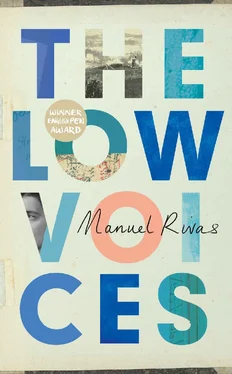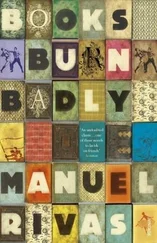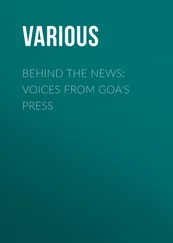Manuel Rivas - The Low Voices
Здесь есть возможность читать онлайн «Manuel Rivas - The Low Voices» весь текст электронной книги совершенно бесплатно (целиком полную версию без сокращений). В некоторых случаях можно слушать аудио, скачать через торрент в формате fb2 и присутствует краткое содержание. Год выпуска: 2016, Издательство: Harvill Secker, Жанр: Современная проза, на английском языке. Описание произведения, (предисловие) а так же отзывы посетителей доступны на портале библиотеки ЛибКат.
- Название:The Low Voices
- Автор:
- Издательство:Harvill Secker
- Жанр:
- Год:2016
- ISBN:нет данных
- Рейтинг книги:5 / 5. Голосов: 1
-
Избранное:Добавить в избранное
- Отзывы:
-
Ваша оценка:
- 100
- 1
- 2
- 3
- 4
- 5
The Low Voices: краткое содержание, описание и аннотация
Предлагаем к чтению аннотацию, описание, краткое содержание или предисловие (зависит от того, что написал сам автор книги «The Low Voices»). Если вы не нашли необходимую информацию о книге — напишите в комментариях, мы постараемся отыскать её.
A brilliant coming-of-age novel from one of Spain’s greatest storytellers,
is a humorous and philosophical take on memory, belonging, and the nature of storytelling itself.
The Low Voices — читать онлайн бесплатно полную книгу (весь текст) целиком
Ниже представлен текст книги, разбитый по страницам. Система сохранения места последней прочитанной страницы, позволяет с удобством читать онлайн бесплатно книгу «The Low Voices», без необходимости каждый раз заново искать на чём Вы остановились. Поставьте закладку, и сможете в любой момент перейти на страницу, на которой закончили чтение.
Интервал:
Закладка:
He clicks his tongue.
Says, ‘Old wives’ tales!’
Now that’s a wild man.
7. The Saxophone’s Farewell
MY FATHER NEVER travelled by plane. He had already seen the face of that strange aviator and been warned about aviation.
By train, he travelled often. Especially when he was young. On the roof of the carriage. He regarded the day he was told he was going to work as a bricklayer’s mate on a building site in A Coruña as a kind of liberation. Unlike in that story by Clarín, ‘¡Adiós, Cordera!’, in my father’s story the cow was the one who was sad, while my father’s heart leapt for joy the day he left the green prison of the meadows behind. He never missed his time as a herdsman. And he certainly would have had no interest in being described as a ‘friend of animals’. Despite the headbutt that occurred during the aeronautical episode, it wasn’t a question of fear or hatred. He almost always kept a polite, but non-negotiable distance from them, even if they were pets. The most notable exception was Knuckle, a small, long-tailed mongrel who could not be described as being so clever, all he had to do was talk. I am one of those who think that animals talk, but we don’t understand them. What made Knuckle different was that you could understand a large part of what he was saying. He expressed himself with great sincerity, albeit with a hint of irony. In my father’s opinion, he wasn’t exactly a person. He was something else: a personage. During the long winter evenings, they would watch television together. They also shared an enjoyment of music. For my father, humankind’s greatest achievement was a band of jazz musicians.
‘They play like God!’
Knuckle died soon after I started working as a journalist. I wrote an article in which I shared a concern raised by my mother: can an animal like Knuckle go to heaven? The surprising thing was that, a few days later, a wise theologian, Andrés Torres Queiruga, replied by saying, ‘Why ever not?’ Animals had souls. And there was no reason for humans to be left alone in the beyond. My mother cut out the article, and it was one of the things she kept in her bedside table while she was alive.
It came time to slaughter the pig, and my father did the opposite of most people. He disappeared.
The little house in Castro de Elviña, where we went to live in 1963, was in a remote place known as Nacha Mount, next to a dirt track that led up to O Escorial and the broadcasting tower of Radio Coruña. One of the first nuggets of information I gleaned, with dismay, from locals was that this summit was where the wind turned around. A quality that is attributed to many summits, but in this case — and all you had to do was hear the sullen roar of the eucalyptuses — seemed much more realistic. It wasn’t just one or two witnesses who said this. Everybody made the same remark: ‘You’re going to live where the wind turns around!’ That business of watching the wind change direction was something that kept me occupied — and preoccupied — for quite some time. Especially when my father declared, ‘The city will never reach here!’ There was some truth in this. The seagulls from A Coruña always turned back here, at the ne plus ultra of the enormous radio tower, even when it was stormy. The starlings did the same, drawing sudden cartoons in the sky. But the crows didn’t. The crows flew high overhead, on their own or in ragged formation, and then suddenly swooped down or soared towards the unknown. I rather liked the crows. In church, always damp and cold, our bodies petrified like the rest of the temple, there was a point at which we revived, and it was when the priest read that part in the Book of Genesis with the episode about Noah’s Ark. Everybody watching the priest’s hands as he mimics the action of releasing the dove and the raven with their mission as meteorological informers after the flood. The dove came back with an olive leaf in its beak, but nothing else was ever said about the crow. Whatever happened to it? Of course, it never came back. All you had to do was see it up there, on our mountain. Roaming free. The dove is a journalist. The crow, that vagabond, is a poet. The cuckoo as well. The cuckoo also continued with its journey. I never heard the cuckoo so clearly again. One of the few times my grandfather the carpenter broke his silence was to tell me a proverb slowly, like someone distilling a haiku: ‘If the cuckoo doesn’t sing in March or April, either the cuckoo is dead or the end is coming.’ There was a large rock that bore its name and had its shape, a winged stone bird whose beak pointed in the direction of the lighthouse. A rock that was about to fly, this was its position. Every year, in March or April, the cuckoo came by. It was on its way north from somewhere in Africa. There must have been a saga of African cuckoos following the same path. It was obvious the route was intentional because the cuckoo didn’t hurry past. It cuckooed for a while, growing louder and softer. All our desire focused on our sight, on wanting to see the cuckoo. A Zapateira back then was an unending expanse of mystery, a no man’s land inhabited, for us, by imaginary creatures that sometimes came visiting in the shape of a fox, a rabbit, a weasel or a barn owl. It was also the first place the cuckoo sang. There was still no road there, no golf club. Until the road and the golf course were built. And Franco’s retinue arrived in summer, the whole mountain bristling with hundreds of guards. Up high, we were never sure whether the wind jostled the crows, their ragged flight, or the crows directed the wind.
My father couldn’t stand the pig slaughter, or that of any other animal. He would build the sheds, the pens, the cages — that small, domestic farm around our garden. He would help to raise them. He built the bath, that trough where the pig was preserved in salt. The pig slaughter used to take place during St Martin’s summer, under the November sun. It was a day of great festivity in every household. In popular Galician culture, which is so Pantagruelian, the pig is a providential source of nourishment, so to speak. There is the eloquent image of a local who is asked his favourite bird and looks up at the sky to exclaim, ‘If only pigs could fly!’ There are lots of laudatory proverbs, and they aren’t always that old. Like the one that says, ‘The pig has saved more people than penicillin.’ But my father would disappear that day. He didn’t want to know anything about the slaughter. His horror was not even modified by a desire for revenge. When he was self-employed, he would sometimes go months without getting paid. After such periods of abstinence, sometimes the whole lot would come along at once. The house was isolated. An easy target for thieves. Things would get stolen some Sundays when we weren’t there. There wasn’t that much to take. The point is, one Saturday my father got paid for the work of several months. The next day we were invited to a family gathering. Where to keep the money? The idea was brilliant. He put the peseta notes in an empty paint pot. A metal pot with a secure lid he hid in the pigsty, beneath the undergrowth that served as bedding. He shut the door with a padlock. The idea was brilliant. Who would ever think of such a hiding place? When we came back in the evening, the padlock was still in place. He opened the door. The first thing he saw was the pot. Without its lid, and with nothing inside. The pig had rooted and rooted until it found the pieces of paper. In a flash, the animal had gobbled down the work of months. But my father didn’t go to that slaughter either.
One of my uncles would carry out the task of killing the pig. The labours that followed were performed like a rite: scorching the skin with torches, washing it, opening it, cutting it into pieces, salting it. My mother took care of all the preparations. She also found the arms to hold the animal down. The role of executioner was not imbued with any ritual content or artistic display. It was just a question of killing. Identifying the fastest route to the heart and sticking the knife in. Quickly, but carefully. I remember being there when they made the cut to collect the flow of blood in a bowl. And to stir the blood, which would go to making blood sausages, so it didn’t coagulate.
Читать дальшеИнтервал:
Закладка:
Похожие книги на «The Low Voices»
Представляем Вашему вниманию похожие книги на «The Low Voices» списком для выбора. Мы отобрали схожую по названию и смыслу литературу в надежде предоставить читателям больше вариантов отыскать новые, интересные, ещё непрочитанные произведения.
Обсуждение, отзывы о книге «The Low Voices» и просто собственные мнения читателей. Оставьте ваши комментарии, напишите, что Вы думаете о произведении, его смысле или главных героях. Укажите что конкретно понравилось, а что нет, и почему Вы так считаете.












